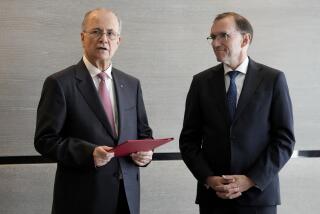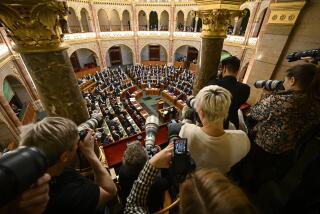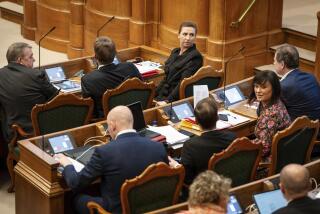Danes Reverse Course, Ratify European Treaty : Unity: The 56% majority vote breathes new life into union plan. Nation is exempted from some provisions.
COPENHAGEN â Danish voters, breathing new life into the cause of European unity, reversed course Tuesday and ratified the European Communityâs treaty on economic and political union.
Final results showed 56.8% of the voters supported the treaty and 43.2% opposed it. The 85% voter turnout reflected the intense interest that the treaty had generated.
âWe have taken a decision that will have historic significance both for our country and for Europe,â said an elated and relieved Poul Nyrup Rasmussen, Denmarkâs prime minister.
Last June, Danish voters, expressing fears that a powerful European Community would rob Denmark of its cherished national identity, at least temporarily derailed European unity. By a much closer 50.7% to 49.3%, they refused to ratify the treaty, which could give the EC a common currency by the end of the decade and would establish procedures for setting common EC foreign and defense policies.
Leaders of the 12 EC nations paved the way for the second vote by promising Denmark the right to stay out of many of the treatyâs most important provisions, including the single EC currency and common EC defense policies.
The treaty, initialed by the 12 EC leaders in the Dutch town of Maastricht in December, 1991, cannot take effect without ratification by all 12 EC member nations.
Denmark became the 10th EC country to ratify the Maastricht Treaty. The British Parliament, where opposition runs high, has been waiting to see what the Danes would do, and ratification there is not guaranteed. The German Parliament has voted to ratify, but final action awaits the outcome of a series of legal challenges to the ratification procedures.
Even if the Maastricht Treaty can clear these last two hurdles, its practical effect will probably be blunted by the opposition that has developed throughout Western Europe to many of its goals since last Juneâs ânoâ vote in Denmark.
Policy-making at the EC has been all but paralyzed since last Juneâs Danish referendum. Jacques Delors, president of the ECâs executive commission in Brussels, said the new result from Denmark would provide âa stimulus to the Community to leave behind a period of gloom and inaction.â
Rasmussen said the treatyâs roller-coaster ride in Denmark has served notice to Delors that Europeans fear the transfer of powers from their national governments to EC headquarters in Brussels.
The Danish debate, he said, would âmake Europe more open, more democratic, more near the people.â
Seven of the eight parties represented in Denmarkâs Parliament, including Rasmussenâs Social Democratic Party, supported the Maastricht Treaty.
Even the small, conservative Progress Party, the only one of the eight parties to oppose the treaty this time, found reason for satisfaction. âNow Europeans wonât find that theyâve been run over by a European Community outside of their control,â said Kim Behnke, a Progress Party deputy.
But even as ruling parties celebrated the result, more than 300 Copenhagen protesters incensed by the referendum clashed with police in what local residents and officials called the worst rioting in years, news agencies reported. At least 24 people, including 20 police officers, were injured.
Voters in Tuesdayâs referendum split into two basic camps: those who believe Denmark needs to play a role in a united Europe, and those who fear that the tiny country of 5 million people will be swallowed up in a federal Europe.
âThe treaty will make Denmark stronger,â said Holger Schieening, 35, who owns a nursery in Hillerod, about 25 miles north of Copenhagen. âInstead of being a small, isolated country, we can work together with the rest of Europe.â
In the other camp is Tenna Madsen, 20, a teacher in a Copenhagen preschool, who warned: âWith Maastricht, Europe is going to become another United States. Denmark will just be a small state in a giant Europe.â
More to Read
Sign up for Essential California
The most important California stories and recommendations in your inbox every morning.
You may occasionally receive promotional content from the Los Angeles Times.










